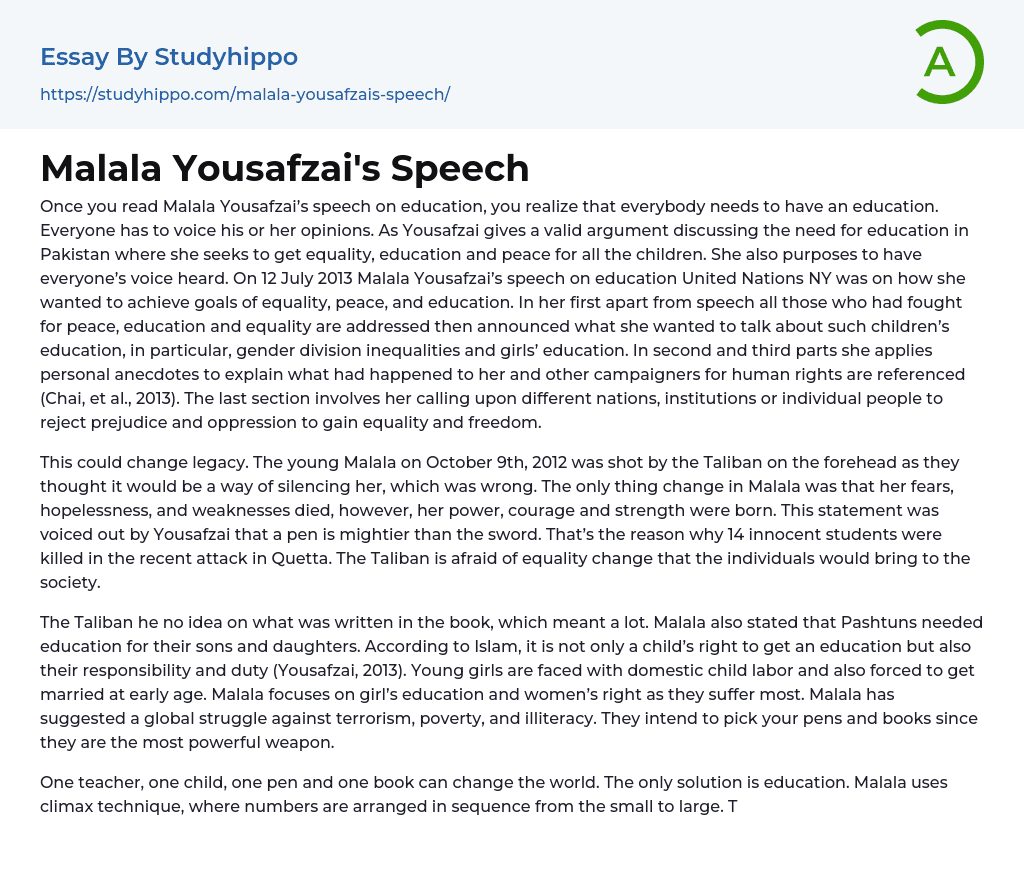Once you read Malala Yousafzai’s speech on education, you realize that everybody needs to have an education. Everyone has to voice his or her opinions. As Yousafzai gives a valid argument discussing the need for education in Pakistan where she seeks to get equality, education and peace for all the children. She also purposes to have everyone’s voice heard. On 12 July 2013 Malala Yousafzai’s speech on education United Nations NY was on how she wanted to achieve goals of equality, peace, and education. In her first apart from speech all those who had fought for peace, education and equality are addressed then announced what she wanted to talk about such children’s education, in particular, gender division inequalities and girls’ education. In second and third parts she applies personal anecdotes to explain what had happened
...to her and other campaigners for human rights are referenced (Chai, et al., 2013). The last section involves her calling upon different nations, institutions or individual people to reject prejudice and oppression to gain equality and freedom.
This could change legacy. The young Malala on October 9th, 2012 was shot by the Taliban on the forehead as they thought it would be a way of silencing her, which was wrong. The only thing change in Malala was that her fears, hopelessness, and weaknesses died, however, her power, courage and strength were born. This statement was voiced out by Yousafzai that a pen is mightier than the sword. That’s the reason why 14 innocent students were killed in the recent attack in Quetta. The Taliban is afraid of equality change that the individuals would bring to the society.
The Taliban he no ide
on what was written in the book, which meant a lot. Malala also stated that Pashtuns needed education for their sons and daughters. According to Islam, it is not only a child’s right to get an education but also their responsibility and duty (Yousafzai, 2013). Young girls are faced with domestic child labor and also forced to get married at early age. Malala focuses on girl’s education and women’s right as they suffer most. Malala has suggested a global struggle against terrorism, poverty, and illiteracy. They intend to pick your pens and books since they are the most powerful weapon.
One teacher, one child, one pen and one book can change the world. The only solution is education. Malala uses climax technique, where numbers are arranged in sequence from the small to large. The another name that is heard is one herself thus making her seem isolated and alone and through this manipulating her emotions (Yousafzai and McCormick, 2014). Malala also uses contrast to make all the points to seem convincing, dear brothers and sisters, we know the significance of light when there is darkness. The importance of voice is realized when we are silent.
Conclusion
Yousafzai can use a variety of speaking techniques in manipulating our emotions in her favor as she delivers her information making the dialogue effective and powerful. She uses body language to pass her emotions and the formality, her pace to add strength and power to her words. She uses repetition to pass her point, personal anecdotes, and quotations to include the people in her experience, and morality to manipulate our emotional and show her maturity. Overall her speech is full of power,
courage, and strength in adversity face.
References
- Chai, J., Gordon, R., & Johnson, P. A. (2013). Malala Yousafzai: A Young Female Activist.
- Yousafzai, M. (2013). The full text: Malala Yousafzai delivers defiant riposte to Taliban militants with speech to the UN General Assembly. The Independent.
- Independent Digital News and Media, 12.
- Yousafzai, M. (2013). I am Malala: The girl who stood up for education and was shot by the Taliban. Hachette UK.
- Yousafzai, M., & McCormick, P. (2014). Malala: How One Girl Stood Up for Education and Changed the World. Hachette UK.




